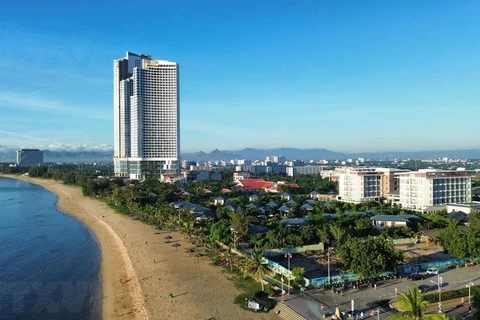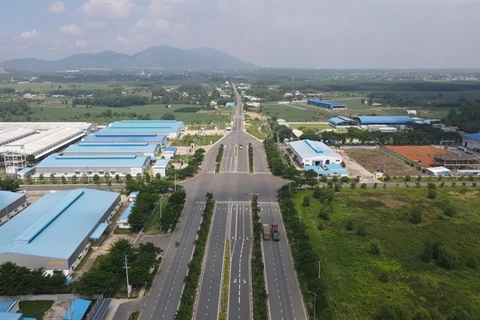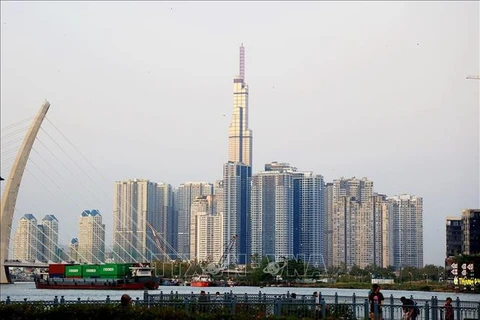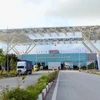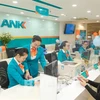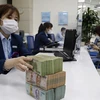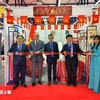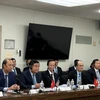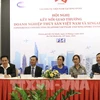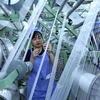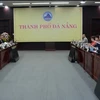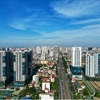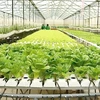Hanoi (VNA) – The industrial real estate segment has emerged as a driver of the property market after sailing through the economic storm last year thanks to the foreign direct investment (FDI) influx, experts have said.
The investment was funneled into 16 out of the 21national economic sectors in January, of which real estate attracted the second largest amount with nearly 1.41 billion USD or 32.7% of the total FDI, up more than 3.5-fold year-on-year.
In this regard, processing and manufacturing took the lead with some 2.54 billion USD, accounting for 59.1% of the accumulative FDI and representing a year-on-year rise of 16.8%.
To lure more big projects and investors to Vietnam, the Prime Minister has assigned concrete tasks to ministries and agencies, said Deputy Minister of Planning and Investment Tran Quoc Phuong, adding his ministry will prioritise investment attraction to science-technology, innovation, semiconductor chip and new industries.
According to the official, issues regarding infrastructure and land remain concerns for foreign investors. Therefore, large-scale infrastructure projects should be sped up and more attention paid to the enforcement of the amended Land Law.
Industrial land lease prices are forecast to increase by 5-9% annually in the northern region, and 3-7% in the south thanks to the rising demand from industrial groups, said property consultancy CBRE Vietnam.
Ready-built warehouse rental prices are anticipated to climb by 1-4% in the next three years, it said.
The firm noted that the bright prospects are attributed to the continued expansion of foreign businesses in Vietnam and the rising registrations of new foreign investors.
The investment was funneled into 16 out of the 21national economic sectors in January, of which real estate attracted the second largest amount with nearly 1.41 billion USD or 32.7% of the total FDI, up more than 3.5-fold year-on-year.
In this regard, processing and manufacturing took the lead with some 2.54 billion USD, accounting for 59.1% of the accumulative FDI and representing a year-on-year rise of 16.8%.
To lure more big projects and investors to Vietnam, the Prime Minister has assigned concrete tasks to ministries and agencies, said Deputy Minister of Planning and Investment Tran Quoc Phuong, adding his ministry will prioritise investment attraction to science-technology, innovation, semiconductor chip and new industries.
According to the official, issues regarding infrastructure and land remain concerns for foreign investors. Therefore, large-scale infrastructure projects should be sped up and more attention paid to the enforcement of the amended Land Law.
Industrial land lease prices are forecast to increase by 5-9% annually in the northern region, and 3-7% in the south thanks to the rising demand from industrial groups, said property consultancy CBRE Vietnam.
Ready-built warehouse rental prices are anticipated to climb by 1-4% in the next three years, it said.
The firm noted that the bright prospects are attributed to the continued expansion of foreign businesses in Vietnam and the rising registrations of new foreign investors.
Occupancy of industrial land in the north and the south stood at 81% and 92%, respectively, in the fourth quarter of 2023.
The total area of new industrial property sold in the north jumped 37% to a five-year high of over 800 hectares.
But it fell by 32% in the south due to the limited supply of new land, although it remained high at 500 hectares in terms of area.
In addition to the electronics and auto industries, high-tech ones such as electric vehicles, semiconductors, and green materials are also eyeing Vietnam’s industrial real estate, CBRE noted.
CBRE Vietnam Senior Director Nguyen Hoai An said semiconductors and EVs are predicted to boost the future demand, especially in the context that Vietnam is expanding its cooperation with major economies.
However, the country needs to make preparations in terms of infrastructure, human resources and quality industrial products to maximise these opportunities, she suggested.
Paul Tonkers, Deputy Director of Industrial Real Estate at Core5 Vietnam, said he believes that investors are focusing on such high-value industries as electronics and semiconductors, so industrial park developers need to restructure their services and products to serve tenants' needs well.
Currently, not only auto component manufacturers but also most of individual investors and international organisations view Vietnam as a potential destination, he stressed.
The industrial real estate segment is expected to remain a firm pillar this year on the back of the FDI flow which is on the rise thanks to tax incentives and perfecting infrastructure./.
The total area of new industrial property sold in the north jumped 37% to a five-year high of over 800 hectares.
But it fell by 32% in the south due to the limited supply of new land, although it remained high at 500 hectares in terms of area.
In addition to the electronics and auto industries, high-tech ones such as electric vehicles, semiconductors, and green materials are also eyeing Vietnam’s industrial real estate, CBRE noted.
CBRE Vietnam Senior Director Nguyen Hoai An said semiconductors and EVs are predicted to boost the future demand, especially in the context that Vietnam is expanding its cooperation with major economies.
However, the country needs to make preparations in terms of infrastructure, human resources and quality industrial products to maximise these opportunities, she suggested.
Paul Tonkers, Deputy Director of Industrial Real Estate at Core5 Vietnam, said he believes that investors are focusing on such high-value industries as electronics and semiconductors, so industrial park developers need to restructure their services and products to serve tenants' needs well.
Currently, not only auto component manufacturers but also most of individual investors and international organisations view Vietnam as a potential destination, he stressed.
The industrial real estate segment is expected to remain a firm pillar this year on the back of the FDI flow which is on the rise thanks to tax incentives and perfecting infrastructure./.
VNA

